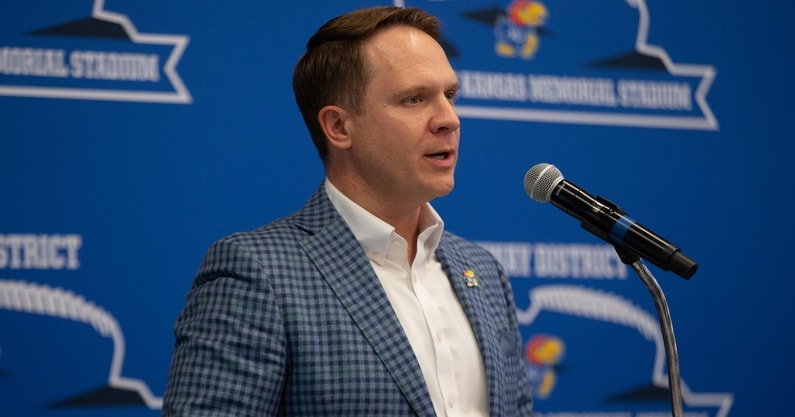Kansas AD Travis Goff on changes in college athletics: 'No reason not to be positive'

Kansas athletic director Travis Goff didn’t want to hear anymore negativity when it came to the changes in college athletics. He chose the positivity end of the spectrum after the House Settlement and revenue sharing were approved.
Sure, the transfer portal and NIL has run rampant in college football and throughout pretty much all sports. But, Goff is ready to move everything in the right direction by saying the sky hasn’t fallen yet.
But that’s the key term: “yet.” It’s fair to wonder if Goff’s comments are up for interpretation if the college athletics space gets worse before it gets better.
“Probably one of those moments that you log off, you know, log off X,” Goff said on Sirius XM. “It’s something that my wife advises me to do, and I didn’t, but it’s a little bit because you just get tired of such a negative kind of perspective. At least I do personally, like, Hey, this is a big moment. There’s no reason not to be positive and optimistic. It’s not perfect.
“But somebody tell me where perfection lies in this space in particular. And I’ll be honest, I just think let’s put our names behind something if we’re going to go out there and have a ton of commentary, let’s be able to own our comments, our statements. And if you’re not going to do that … the sky hasn’t fallen, yet I know we continue to claim that it is in our industry, but it hasn’t yet.”
Goff may be correct that the best is yet to come for college athletics. But it’s safe to be concerned about the future of non-revenue and Olympic Sports in a revenue-based world. SEC commissioner Greg Sankey recently addressed that topic.
Top 10
- 1New
Paul Finebaum
Rips Pac-12 additions
- 2
NBA Mock Draft
Top 5 shakeup
- 3Hot
Diego Pavia
Takes shot at Big Ten
- 4
Top 25
Preseason CFB rankings
- 5Live
College World Series
Updated scores, bracket, schedule
Get the On3 Top 10 to your inbox every morning
By clicking "Subscribe to Newsletter", I agree to On3's Privacy Notice, Terms, and use of my personal information described therein.
“The second is at least in the Southeastern Conference — and we have to be aware that, as you have a $20 million outflow from a revenue sharing standpoint, that creates pressures,” Sankey said Friday on FanDuel Sports Network’s Golic and Golic. “And you’ve seen stories about that pressure resulting in some changes to personnel, or maybe the way expenditures are overseen in athletic departments. What has been the topic of focus in our room is not reducing the sport opportunities. That’s speculated about.
“What I will say is there has to be a point where this revenue-sharing model and the third-party oversight sticks and is consistent. And we have that opportunity now. If it continues to grow, I think that’s an enormous threat to those Olympic sports, or the non-revenue sports.”
Per the terms of the House v. NCAA settlement, schools have the ability to share up to $20.5 million with athletes if they opt in to revenue-sharing. Football is expected to receive 75%, followed by men’s basketball (15%), women’s basketball (5%) and the remainder of sports (5%). The amount shared in revenue will increase 4% annually.
The growing sense is that schools will be able to decide how to divide up their revenue-sharing after House settlement approval. Big 12 commissioner Brett Yormark said that’s the case in his conference, which Goff likely alluded to as a positive, and some schools in others have confirmed which sports will participate in revenue-sharing.